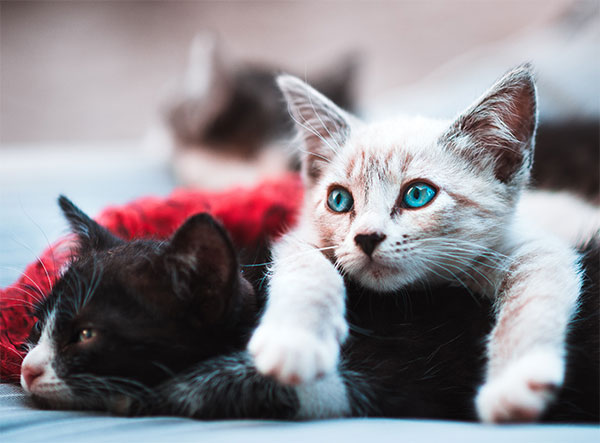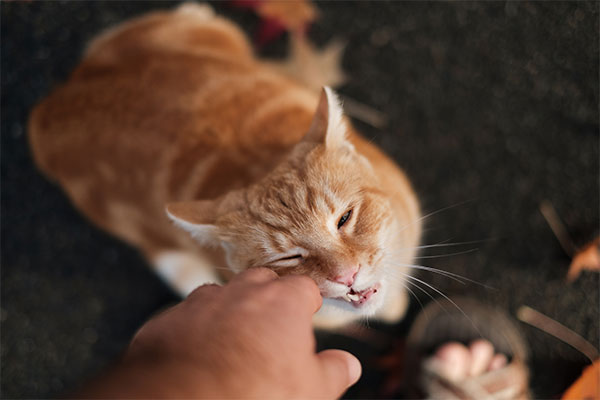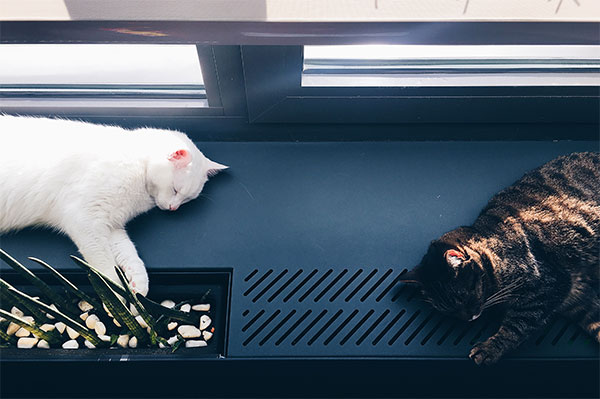CBD Oil for Cats: Will it Help Their Anxiety?
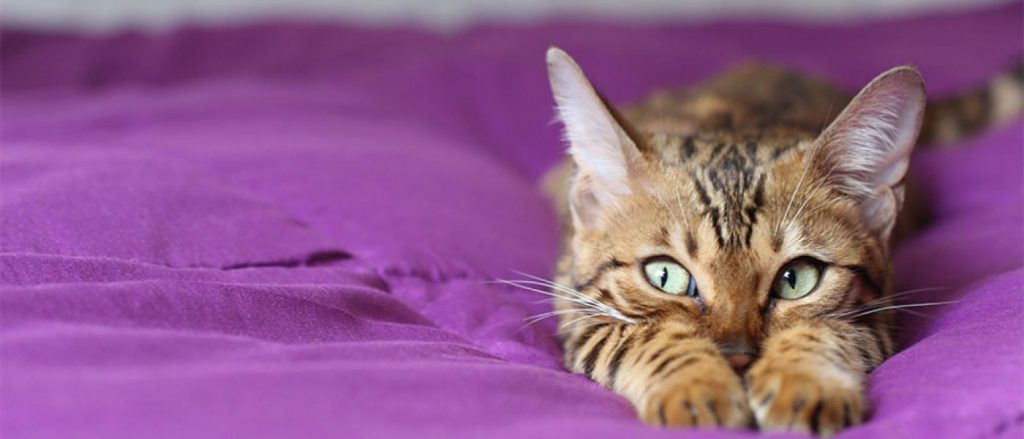
A common concern among many cat owners is how to help their cats manage anxiety. For some cats, it takes something big to create anxiety and for others, even the smallest changes in daily life can cause upheaval and uncertainty. Some cat owners will investigate behavioral therapy and others will talk to their veterinarians about incorporating medication. Then there are the owners who simply don’t know what to do. Whether it’s an ongoing generalized anxiety or situational anxiety, cat owners want their cats healthy and happy.
The soaring popularity of Cannabidiol (CBD) oil has resulted in more people turning to CBD for their pets to help not only with physical pain but also with behavior issues. The CBD (cannabidiol) market, though certainly causing quite a buzz, is not yet fully backed by science and the claims companies make often lack scientific substantiation. Despite that, cat owners are encouraged by anecdotal evidence and are buying CBD products. Is CBD oil for cats a miracle remedy for anxiety? Is it safe and effective? Based on all the anecdotal success stories you would certainly think so but it’s not that simple.
What is CBD Oil?
CBD is a compound derived from hemp. To be considered CBD, the oil must contain less than 0.3 percent of tetrahydrocannabidol (THC). Therefore, CBD, does not cause any psychoactive reaction. The fact that CBD can have beneficial effects without these psychoactive side-effects makes it appealing to cat owners when it comes to administering to their pets.
Is CBD Oil Safe for Cats?
The problem is that the CBD market is still relatively new and not yet well-regulated or third-party/government tested for safety. It may be difficult for consumers to be sure of what they’re buying. How do consumers know the product is correctly labeled? With regulated veterinary medications, veterinarians have accurate information regarding proper dosages, potential side effects, contraindications, toxicity levels and length of treatment. With CBD, there’s inconsistent information as well as whether the CBD oil in the product is even of good quality. Depending on where it’s purchased, there is the risk that there’s no CBD oil contained in the product at all. Depending on the manufacturing facility, a consumer can’t be certain the CBD oil is free of contaminants. Improperly formulated CBD oil that contains higher amounts of THC can be very toxic to pets.
Other Risks of CBD Oil in Cats
In addition, there’s another major concern. Some cat owners may be doing their own diagnosis on a cat and bypassing the veterinarian visit altogether. Skipping the veterinary exam and not getting an accurate diagnosis can be harmful to the cat or even life-threatening. Anxiety and stress may be due to an underlying medical problem. Although the cat may show improvements on CBD, it doesn’t other reasons for the anxiety such as intercat relationship issues, changes in the home environment and other potential stressors. Suppressing a behavior problem is not the same as identifying, understanding and resolving it.
12 Safe and Effective Ways to Help Treat Anxiety in Cats
If your cat seems anxious or stressed, your first step is to have the cat examined by the veterinarian. Don’t assume a problem is strictly behavioral before ruling out potential underlying medical causes.
Some ways to help ease your cat’s anxiety include:
1. Hiding places:
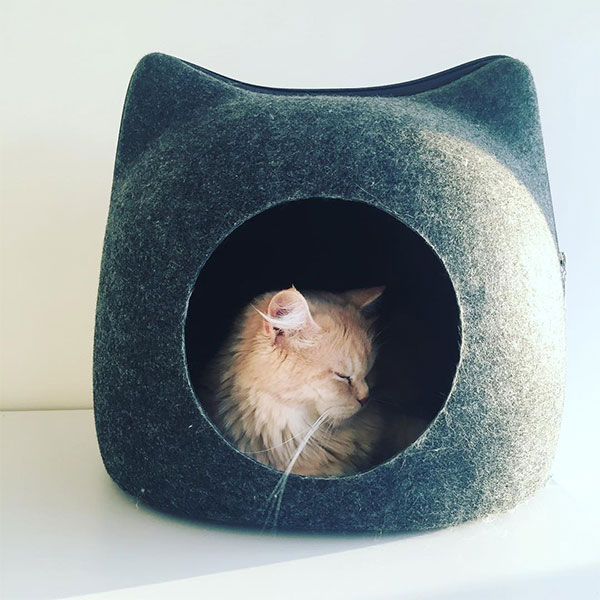
Photo via @lilfranklestein_3
Hiding is a valuable coping mechanism for cats. Give your cat several hiding options in the home. Examples include: A-frame beds, boxes on their sides, paper bags without handles, cubbies, or cat tunnels. These provide easy ways for a cat to feel “invisible” and calm down.
2. Interactive Playtime:
Play is more than just exercise and fun. Playtime is a valuable therapy and helps release beneficial neurotransmitters. Engage your cat in at least two interactive play sessions a day. Use a fishing pole-type toy and move it so it imitates prey, allowing your cat to stalk, pounce and capture.
3. Food Puzzles:
Puzzle feeders are another wonderful way to exercise a cat’s natural hunting instinct. Puzzle feeders should be challenging but not frustrating in order to maintain the fun factor. Stuff a puzzle feeder with low-calorie, tasty treats like Wellness Kittles to keep your cat engaged with the activity. As with interactive playtime, food puzzles also help release beneficial neurotransmitters into the system.
4. Desensitization:
Train your cat to become comfortable with activities such as being in a carrier, car travel, unfamiliar people and handling. Gradual, positive and gentle training will help your cat become more at ease with each baby step.
5. Pheromone Therapy May Help:
There are artificial feline facial pheromone products available that may help cats associate objects and locations with comfort and familiarity. These products come in spray form and diffusers.
6. Provide Choice:
Don’t underestimate the importance of choice. Cats should have the choice of whether to engage or retreat. Forced interaction, holding or petting can create anxiety. Pay attention to a cat’s body language to see whether you are being invited closer or to keep your distance.
7. Play Music:
Classical and soft music may help calm your cat. There are even some cat-specific music CDs and downloads to play to help ease stress and anxiety. Many shelters use music to help with stress reduction.
8. Reduce Intercat Aggression:
Reduce anxiety and tension between cats by creating an environment where they don’t have to compete for resources. Some examples that help include increased number and locations of litter boxes, separate feeding stations, provide more bed locations, include elevated perches and provide enough scratching posts.
9. Perches and Cat Trees:
Your cat needs elevated perches and places to climb. It will help him get away from any chaos happening on ground level. Increased vertical territory can also help ease tension in multicat environments. Many cats feel more secure when they’re up high.
10. Quality Time Together:
You may be the most effective anxiety-reducer for your cat. Spend quality time together with your cat in ways he enjoys. Some cats love having close contact with their human family members and others may prefer being nearby while you read or watch TV. Cats left alone too much can become anxious.
11. Let the Sun Shine in:
Open curtains and let the sun in so your cat can enjoy the warmth and relaxation of sunbathing. Some cats also enjoy watching the view out the windows.
12. Call in a Professional:
If you aren’t able to alleviate the anxiety and feel you need more help, ask your veterinarian for a referral to a veterinary behaviorist or a certified cat behavior consultant. A behavior professional may be able to help uncover the anxiety triggers and develop a treatment plan customized for your specific cat.
Conclusion
CBD may ultimately be very promising but as of yet, there haven’t been enough studies and science behind it. We look forward, with interest, in seeing more research on effectiveness and safety.






